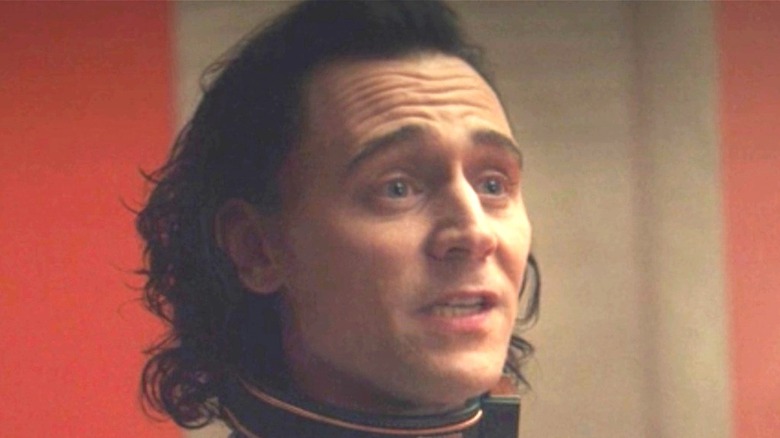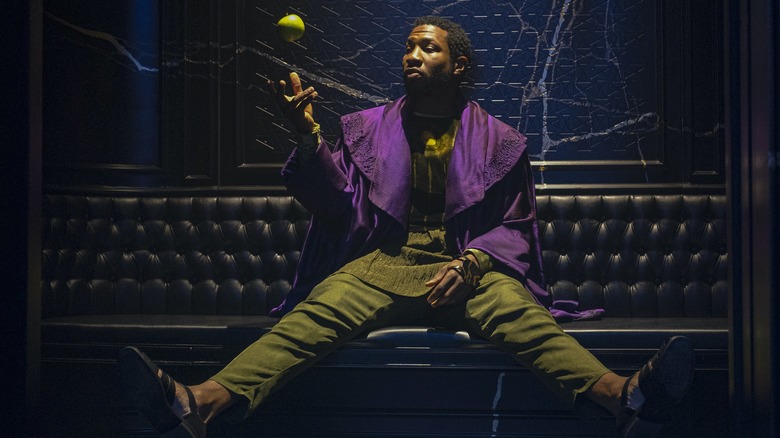Loki Head Writer Attempts To Clarify How Marvel's Multiverse Works
The multiverse is a big concept, and, since none of us has ever interacted with a parallel universe (at least so far as we know), there's really no way of knowing if there are alternate realities and what they might hypothetically be like. Of course, that doesn't stop us from telling stories about multiverses and chasing that super string theory like we're some sort of highly theoretical cat.
For the last few years, the MCU has teased the idea of a multiverse. It almost seemed like Evan Peters was playing an alternate universe version of Pietro Maximoff on "WandaVision," but then he wasn't. Quentin Beck aka Mysterio (Jake Gyllenhaal) claimed to be from another universe, but he was lying, too.
We knew a multiverse of some kind had to be coming since there's an upcoming MCU film called "Doctor Strange and the Multiverse of Madness," but we didn't really catch a true glimpse of how that might work until the Disney+ series "Loki".
However, despite the existence of the Time Variance Authority (TVA), an organization dedicated to pruning the multiverse in favor of a supposed sacred timeline, and a slew of multiverse incarnations of Loki (Tom Hiddleston), fans still have questions. How does the multiverse work? Thankfully, "Loki" writer and executive producer Michael Waldron is here to explain.
First, a quick recap: when last we left Loki and Sylvie aka Lady Loki (Sophia Di Martino), they'd disagreed upon, but ultimately wound up killing He Who Remains (Jonathan Majors), thus kickstarting the multiverse anew. So, how does that work again?
A great big ball of wibbly, wobbly, multiversal stuff
In an interview with Screen Crush, Michael Waldron explained that "Loki's" approach to time travel is based on the idea that time is always happening. "So there are infinite instances of time always occurring at once," he continued. "So you and I are having this conversation right now. There's another instance of us having this conversation 10 seconds ago. There's another instance of time of us having this conversation 10 seconds in the future. Generally, those three instances — you could literally say they're all different universes in a way different timelines — are all the same. There are minute little fluctuations in each instance of time. So in you and I's conversation, five times out of ten, I pick up and I say, 'Hello.' And four times out of ten, I say, 'Hey, nice to meet you.' And then maybe one time out of ten, I'd say, 'Hey man, f*** you. I don't want to do this interview.'"
In other words, most worlds within the multiverse are very similar — but some of them will throw deuces at all your expectations. That's where the TVA intervenes (or at least used to intervene). "The TVA has their own barometer, their own gauge of what constitutes a deviation from the baseline, the way it's supposed to go," says Waldron. "The way it went that produced He Who Remains — that is their baseline. And so they are constantly calculating, 'Okay, we see how time has always...' If you zoomed in on the timeline, it wouldn't necessarily look like a straight line. It might look like almost the intertwined strands of a rope fluctuating and spiking here and there."
The nice thing about Waldron's answer is that it's complicated enough that the MCU can dance around it pretty easily. Sure, we essentially know when and where the TVA intervenes, but that won't limit much moving forward. All bets are off in the (hypothetically) upcoming multiverse war.
The entire first season of "Loki" is streaming on Disney Plus now.

